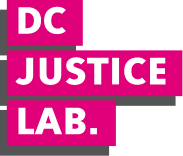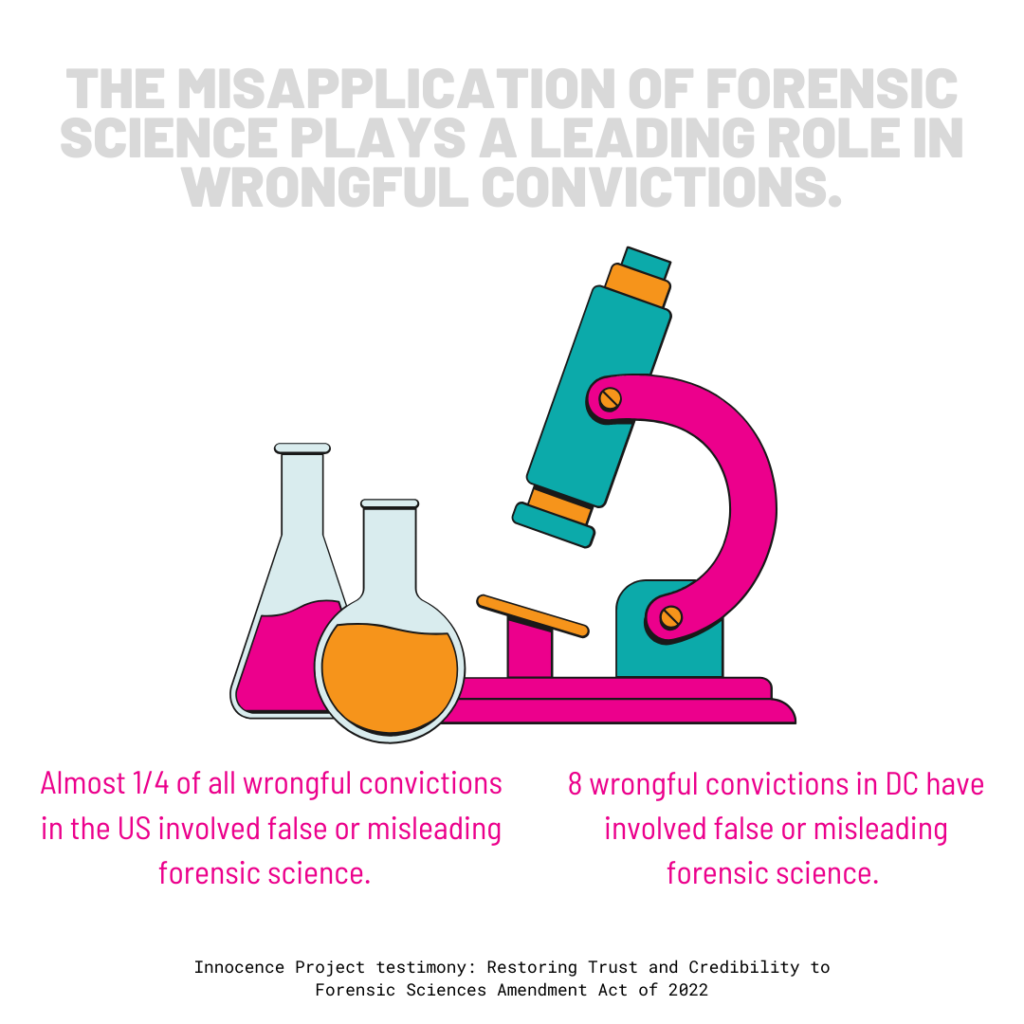
dc crime lab
A failing crime lab means innocent people are convicted of crimes, and victims do not receive justice.
- 6 Minute Read
Without a well-run crime lab that adheres to the best practices in the field of forensic science, innocent people may end up convicted of crimes, guilty people may avoid responsibility for their actions, the whole justice system will be less efficient, and everyone may lose faith in the fairness of the justice system. In DC, the challenges at the Department of Forensics Crime Lab have led to two shutdowns that dramatically slowed the processing of evidence — something prosecutors have said led to an increase in the number of arrests that were not ultimately pursued in court. Other places, like Houston, have worked with lawmakers at the state and local levels to increase their crime labs’ capacity, expertise, and transparency. DC should fully fund and implement the Restoring Trust and Credibility to Forensic Sciences Amendment Act of 2022, re-establish a science advisory board to oversee operations at the lab consistent with this legislation and retain licensed and credentialed experts to run the crime lab.

What you need to know
Crime labs – when operated well – are critical to showing that evidence of a crime is valid.
Crime laboratories (labs) evaluate and maintain evidence from crime scenes using scientific methods to discover objective findings that can be used in court. The forensic evidence processed by crime labs has led to thousands of innocent people who were accused or convicted of crimes being exonerated. Crime labs can analyze physical, chemical, biological, or digital evidence found in criminal cases, including fingerprints and DNA retrieved from skin, blood, and semen samples. Crime labs can also be responsible for preserving a crime scene. Some crime labs analyze gunshot residue, human remains, illicit substances, tool marks on firearms, and bullets and cartridge cases. According to Encyclopedia Britannica, there are at least 400 crime labs in the United States, including one in most states. Most of these labs are located within police or sheriff’s departments, although some are run by prosecutors or the state’s Department of Justice.
Crime labs play a critical role in increasing trust that evidence presented in court is valid.
A well-functioning crime lab that adheres to best practices in forensics is a critical tool for the justice system in building trust around whether facts presented in court are truthful – and that faith is shared by judges, prosecutors, and the defense. When labs work well, they can provide individuals with expertise to evaluate and explain with high confidence to stakeholders that forensic evidence is valid with a high degree of certainty. A failing crime lab means prosecutors toss cases out, doubts are raised around the integrity of convictions, experts cannot be called to testify in court, and justice is delayed for defendants, victims, and the community. An expert review of the DC Crime Lab pointed to stakeholders’ lack of “trust and understanding” of their abilities to explain and show evidence was valid as a key shortcoming of their operations.
DC’s Crime Lab was established to increase the capacity, speed, and expertise to examine forensic evidence.
Before DC created an independent crime lab in 2012 by establishing a Department of Forensic Sciences, law enforcement agencies sent evidence to forensic labs in and outside the District, such as those operated by the Metropolitan Police Department, the Federal Bureau of Investigations, other federal agencies, or relying on neighboring jurisdictions’ facilities. The lack of a dedicated local forensic lab meant that processing times could be longer, and there might have been logistical challenges in coordinating evidence analysis. The type of trained experts specializing in the type of forensic science needed for a particular analysis may not have been available, depending on where the evidence was sent. DC established an independent lab to centralize these processes: the vision was to improve efficiency and speed in handling and analyzing evidence, reduce turnaround times between receiving evidence and analyzing it, and provide specialized services tailored to the needs of DC. Its establishment was consistent with emerging national standards from the National Academy of Science.
The DC crime lab's challenges led to multiple investigations and the suspension of its work.
The DC Crime Lab has faced numerous challenges since it was established. In 2012, fingerprint examiners from the Metropolitan Police Department were largely “grandfathered” into DC’s crime lab without additional training or qualifications screening. At the time, only two of the 11 examiners passed skills tests conducted by an outside contractor before transitioning to the then-new crime lab. By 2015, the national accreditation board ordered DC’s crime lab to suspend DNA analyses, saying that the lab’s procedures were “insufficient and inadequate.” According to the audit, the DNA analysts at DC’s crime lab “were not competent and using inadequate procedures.” The District Office of the Inspector General initiated a criminal investigation of DC’s Crime Lab on December 3, 2020, amid allegations the agency systematically removed the names of analysts from some documents — a move that one former supervisor at the agency said was made to prevent defense attorneys from calling those analysts to testify about mistakes listed in the documents.
The DC Crime Lab lost accreditation, causing delays in processing evidence.
Accreditation recognizes an entity’s technical competence to operate following established standards. Nearly nine out of ten U.S. crime labs have been granted accreditation, most commonly by one of the two largest forensic accreditation bodies. In April 2021, the DC Crime Lab lost its accreditation again after an audit revealed that the institution faced serious issues, including deliberate concealment of information, violations of accreditation standards, and fraudulent behavior. This prevented the DC Crime Lab from being the primary site of analysis of DNA evidence, fingerprints, and drug testing. These functions were outsourced to federal and private labs, slowing down the processing of evidence and securing crime scenes.
The DC Crime Lab's challenges create serious consequences for DC’s justice.
The United States Attorney for the District of Columbia (USAO-DC) has said delays in processing evidence are among the reasons that more than half of arrests were not prosecuted last year. In January 2020, the USAO-DC discovered ballistic analysis mistakes made by lab staff that incorrectly connected two homicides. According to an audit of 60 cases by the USAO-DC and the Office of the Attorney General, discrepancies were found in forensic evidence for 12 of those cases. According to the performance indicators tracked by the mayor’s office, since 2020, the crime lab has seen fewer crime scene reports completed within two weeks, fewer crime scenes responded to within 30 minutes, lower percentages of drug testing completed within 30 days, and a smaller percentage of scientists working at the lab that meet technical competency requirements. The Department of Forensic Science’s annual reports show that between 2020 and 2022, the number of pieces of evidence processed by the DC Crime Lab declined by 33 percent, and the number of fingerprints processed and identified declined by 67 percent.
Legislation designed to fix the issues at the DC Crime Lab has not been implemented.
SNA International, a consulting firm hired to investigate the “failures” of the lab, released a 157-page report on December 8, 2021, calling for a wholesale restructuring of the organization. Building on the recommendations, the Council of the District of Columbia passed the Restoring Trust and Credibility to Forensic Sciences Amendment Act of 2022. The bill would have given the science advisory board more oversight power, required a scientist to head the laboratory rather than a legal advocate or another political figure, and moved control of the lab out of the mayor’s office so it could operate as an independent agency. However, because the Mayor has not included funding for the legislation in the DC budget, this law has not fully taken effect.
The science advisory board of the DC Crime Lab resigned, and the lab is only partially accredited.
A Science Advisory Board (SAB) was appointed by the Mayor to provide advice and guidance to the crime lab leadership on the operations and work of the lab. In June 2023, the board issued a statement that said, “We think that the breadth and depth of SAB expertise is not being fully considered to assist the DFS and DC public. SAB advice or input has not been routinely sought or utilized to support DFS plans or priorities.” It was reported that the Board received a complaint from some current DFS employees arguing that changing evidence collection techniques would strain their resources and lead to less accurate renderings of crime scenes. By April, 2024. it was reported that the entire membership had resigned. In December 2023, some of the lab’s functions were re-accredited, but the firearms unit and the fingerprints unit remain unaccredited.
WHERE TO LEARN MORE
Science News June 2024
December 2021 SNA International
Committee on the Judiciary and Public Safety June 2022
Committee on the Judiciary and Public Safety June 2022
ISHI News September 2023
Our Solutions
DC Should:
- Ensure the Department of Forensic Science achieves full accreditation
- Hire scientists with the appropriate certification and licensure to staff the lab
- Re-instate the Science Advisory Board with the oversight powers imagined under the legislation
- Re-instate the Science Advisory Board with the oversight powers imagined under the legislation.
special thanks
Tiffany Roy




